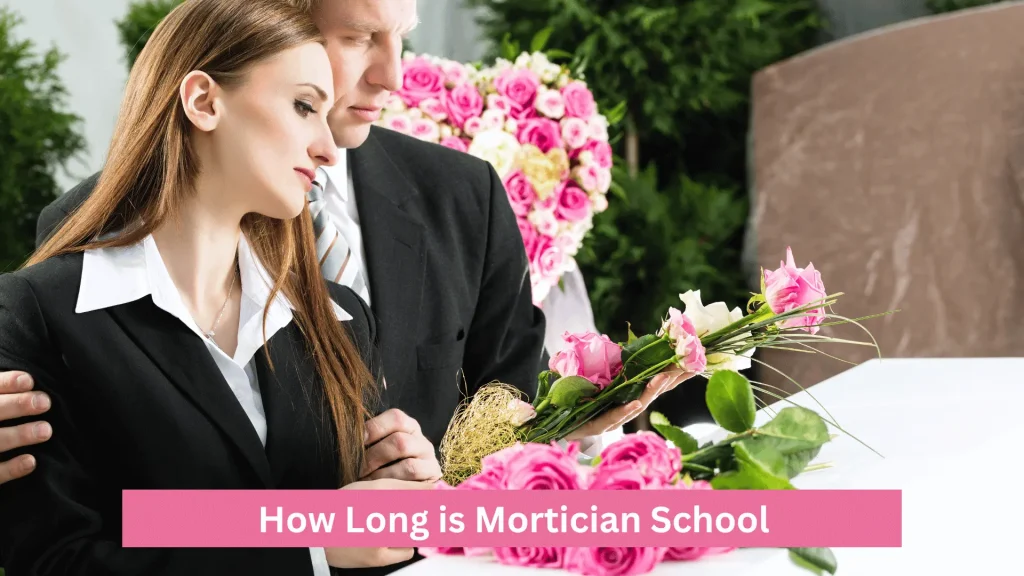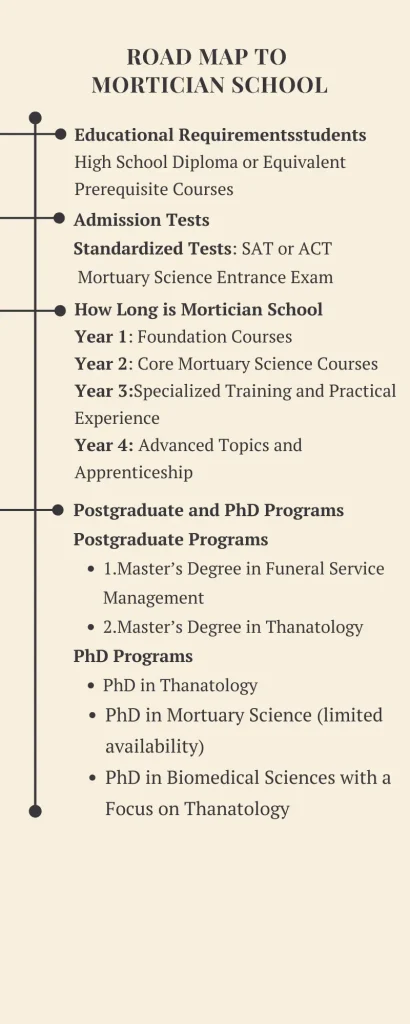How Long is Mortician School
How Long is Mortician School? Typically, completing mortician school takes between 2 to 4 years. This duration includes earning an associate degree in mortuary science and completing an apprenticeship. Each state may have specific requirements, so it’s essential to check local regulations.
What is Mortician School
Mortician school provides specialized education and training in funeral service and mortuary science. Students learn about embalming, restorative art, grief counseling, and business management. The curriculum also covers laws and regulations related to the funeral industry.

Graduates of mortician school are prepared to handle all aspects of funeral services. This includes coordinating with families, arranging transportation of the deceased, and ensuring legal compliance. Practical experience through apprenticeships is often a critical component of their training.
How Long is Mortician School
Year 1: Foundation Courses
General Education: Courses in English, math, and social sciences.
Introduction to Mortuary Science: Basics of funeral service history, ethics, and funeral directing.
Anatomy and Physiology: Understanding human body systems, essential for embalming and restorative art.
Year 2: Core Mortuary Science Courses
Embalming I & II: Techniques and practices for embalming, including hands-on lab work.
Restorative Art: Skills for restoring the appearance of deceased individuals.
Funeral Service Law: Legal aspects, including compliance with state and federal regulations.
Year 3: Specialized Training and Practical Experience
Grief Counseling: Techniques for supporting grieving families.
Funeral Service Management: Business operations, including accounting and marketing for funeral homes.
Apprenticeship I: Initial practical experience under the supervision of a licensed mortician.
Year 4: Advanced Topics and Apprenticeship
Advanced Embalming: Complex embalming techniques for special cases.
Cremation Services: Understanding the cremation process and related services.
Apprenticeship II: Extended hands-on experience, focusing on all aspects of funeral service management and operations.

Upon completion, students are typically prepared to take state licensing exams to become professional morticians
How to Enter Mortician School
Educational Requirements for Mortician School
High School Diploma or Equivalent: A high school diploma or GED is typically required for admission.
Prerequisite Courses: Some programs may require coursework in biology, chemistry, or anatomy.
Minimum GPA: A minimum GPA (often around 2.5 or higher) may be required for admission into competitive programs.
Entry Tests
Standardized Tests: Some schools may require standardized test scores such as the SAT or ACT.
Mortuary Science Entrance Exam: Certain schools may have their own entrance exams focusing on relevant knowledge and skills.
Application Process
Application Form: Complete the application form available on the school’s website.
Transcripts: Submit official high school or previous college transcripts.
Letters of Recommendation: Provide letters of recommendation from teachers, employers, or professionals in the field.
Personal Statement: Write a personal statement or essay detailing your interest in mortuary science and career goals.
Interview: Participate in an interview if required by the program.
Financial Aids
Federal Financial Aid: Complete the Free Application for Federal Student Aid (FAFSA) to qualify for federal grants, loans, and work-study programs.
State Aid: Investigate state-specific scholarships and grants for mortuary science students.
Institutional Scholarships: Many schools offer scholarships based on academic merit, financial need, or specific criteria related to mortuary science.
Private Scholarships: Search for scholarships offered by professional organizations in the funeral service industry, such as the National Funeral Directors Association (NFDA).
Work-Study Programs: Participate in work-study programs that offer part-time employment to help cover education expenses.
Student Loans: Consider federal or private student loans if additional funding is needed.
Post Graduate and PhD Programs in Mortuary Science
Post Graduate Programs
1.Master’s Degree in Funeral Service Management
Duration: Typically 1-2 years.
Focus: Advanced business management, leadership skills, and specialized funeral service techniques.
Coursework: Advanced embalming, grief counseling, funeral home operations, marketing, and ethics.
2.Master’s Degree in Thanatology
Duration: Typically 1-2 years.
Focus: The study of death, dying, and bereavement.
Coursework: Death and dying in different cultures, end-of-life care, ethics, and counseling techniques.
3.Certificate Programs
Duration: Several months to a year.
Focus: Specialized areas such as grief counseling, advanced embalming techniques, or funeral service management.
Coursework: Specific to the area of focus, offering in-depth knowledge and practical skills.
PhD Programs Related to Mortuary Science
PhD in Thanatology
Duration: Typically 3-5 years.
Focus: In-depth research on death, dying, and bereavement.
Research Areas: Psychological aspects of grief, cultural practices, ethical issues, and policy development.
Dissertation: Original research contributing to the field of thanatology.
PhD in Mortuary Science (limited availability)
Duration: Typically 3-5 years.
Focus: Advanced research and academic contributions to the field of mortuary science.
Research Areas: Advanced embalming techniques, funeral service education, and industry innovations.
Dissertation: Extensive research project addressing a significant issue or innovation in mortuary science.
PhD in Biomedical Sciences with a Focus on Thanatology
Duration: Typically 4-6 years.
Focus: Integrating biomedical sciences with the study of death and dying.
Research Areas: Biological processes of death, forensic science, and the impact of diseases on funeral practices.
Dissertation: Original research bridging biomedical sciences and mortuary practices.
Top 10 Mortician Schools

1.Cypress College
Location: Cypress, California
Program: Associate in Science in Mortuary Science
Highlights: Offers a comprehensive mortuary science program with a focus on practical training and academic excellence.
2.Cincinnati College of Mortuary Science
Location: Cincinnati, Ohio
Program: Bachelor of Mortuary Science (BMS), Associate of Applied Science (AAS)
Highlights: Known for its rigorous curriculum and hands-on training, including a state-of-the-art embalming lab.
3.Worsham College of Mortuary Science
Location: Wheeling, Illinois
Program: Associate Degree in Applied Science in Mortuary Science
Highlights: Offers a well-rounded education with a strong emphasis on both practical skills and theoretical knowledge.
4.American Academy McAllister Institute of Funeral Service
Location: New York, New York
Program: Associate Degree in Occupational Studies in Funeral Service
Highlights: One of the oldest mortuary science schools in the U.S., known for its experienced faculty and diverse student body.
5.Dallas Institute of Funeral Service
Location: Dallas, Texas
Program: Associate of Applied Science Degree in Funeral Service
Highlights: Provides a comprehensive program with a focus on modern funeral service practices and technologies.
6.Gupton-Jones College of Funeral Service
Location: Decatur, Georgia
Program: Associate of Science Degree in Funeral Service
Highlights: Known for its strong academic program and hands-on training opportunities in funeral service.
7.Pittsburgh Institute of Mortuary Science
Location: Pittsburgh, Pennsylvania
Program: Associate in Specialized Business, Diploma in Embalming and Funeral Directing
Highlights: Offers a blend of online and on-campus courses with a focus on practical and academic excellence.
8.John A. Gupton College
Location: Nashville, Tennessee
Program: Associate of Arts Degree in Funeral Service
Highlights: Provides a robust curriculum with a focus on traditional and contemporary funeral practices.
9.Commonwealth Institute of Funeral Service
Location: Houston, Texas
Program: Associate of Applied Science in Funeral Service
Highlights: Offers a comprehensive education with a focus on the legal and ethical aspects of funeral service.
10.Miami Dade College
Location: Miami, Florida
Program: Associate in Science in Funeral Service Education
Highlights: Known for its diverse student population and comprehensive program that covers all aspects of funeral service.
These schools are renowned for their rigorous curricula, experienced faculty, and hands-on training opportunities, providing students with the necessary skills and knowledge to excel in the field of mortuary science.
Factors Affecting the Length of Mortician School
Program Type
Associate Degree: Typically takes 2 years to complete.
Bachelor’s Degree: Usually requires 4 years of study.
Certificate Programs: Can range from several months to a year.
State Licensing Requirements
Variations by State: Different states have different requirements for licensure, which can affect the duration of the program.
Additional Coursework or Training: Some states may require additional courses or specific training that can extend the length of the program.
Full-time vs. Part-time Enrollment
Full-time Enrollment: Students typically complete their programs faster by taking a full course load each term.
Part-time Enrollment: Students taking fewer courses per term will take longer to complete their programs.
Apprenticeship and Practical Experience
Mandatory Apprenticeships: Many programs include required apprenticeships, which can add to the overall length of time needed to complete the program.
Duration of Apprenticeships: The length of the apprenticeship varies and can impact the total time spent in school.
Online vs. On-campus Programs
Online Programs: May offer more flexible scheduling, allowing students to potentially complete coursework at a faster pace.
On-campus Programs: Often have more rigid schedules that can influence the time required to finish the program.
Academic Preparedness
Prerequisite Courses: Students may need to complete prerequisite courses before starting the core mortuary science program, extending the time to graduation.
Remedial Courses: Students needing additional support in foundational subjects may require extra time.
Course Load and Scheduling
Accelerated Programs: Some schools offer accelerated programs that allow students to complete their degrees more quickly.
Course Availability: Limited availability of required courses each term can delay completion if students cannot enroll in necessary classes when needed.
Institutional Factors
Curriculum Structure: Differences in curriculum structure and program design among institutions can affect the duration of the program.
School Resources: Availability of resources such as faculty, facilities, and internship placements can impact the length of the program.
Final Verdict
Mortician school length varies due to factors like program type, state requirements, and personal commitments. Understanding these elements helps prospective students plan effectively.
FAQs
1.What are the typical educational requirements for mortician school?
A high school diploma or equivalent is usually required, along with prerequisite courses in biology, chemistry, or anatomy.
2.How long does it take to complete mortician school?
Typically, it takes 2-4 years, depending on whether you pursue an associate or bachelor’s degree and other factors.
3.Are there online programs for mortuary science?
Yes, many schools offer online mortuary science programs that provide flexible scheduling options for students.
4.What are the state licensing requirements for morticians?
Licensing requirements vary by state but generally include completing an accredited program, passing exams, and completing an apprenticeship.
5.What financial aid options are available for mortician school?
Financial aid options include federal and state aid, institutional scholarships, private scholarships, work-study programs, and student loans.
